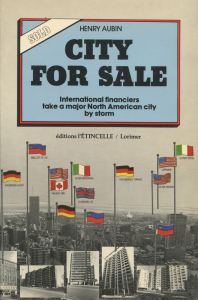Journalism
Career:
One of my proudest moments as a journalist came in 1977 when, with three other journalists, I co-founded the Centre for Investigative Journalism/Centre pour le journalisme d’enquête, the first pan-Canada journalists’ organization; this was a time when the Canadian news media was focusing on covering press conferences and producing fluff. The CIJ helped spark a sea change toward more serious and enterprising work. The Centre eventually evolved into the Canadian Association of Journalists. (My role is described in Behind the Headlines: A History of Investigative Journalism in Canada, by Cecil Rosner, Oxford U. Press, 2008.) I have also been vice-president of the Fédération professionnelle des journalistes du Québec.
Journalistic books:

City for Sale: International Financiers Take a Major North American City by Storm (1977) investigates the global financial and industrial interests that drive 1) the “manhattanization” of major cities and 2) the growth of suburban sprawl. This is the first time the ownership of such interests, which is in many cases secretive, has been identified and analyzed anywhere. Using Montreal as a case study, the probe included more than 400 interviews in seven countries. It documents how the same ownership has been often involved both in the real-estate interests at the forefront of car-reliant sprawl and also in the fossil-fuel and automotive industries that thrive from such a pattern of development. The investigation is still relevant after four decades: its various findings are the subject of the 2018 award-winning documentary Cities Held Hostage and the French version, Mains basse sur la ville. (The book is published by James Lorimer & Co. Published in French as Les vrais propriétaires de Montréal by Éditions l’étincelle.)
Le Monde diplomatique: “A passionately interesting and extremely useful investigation with global ramifications.”
Washington Post: “A valuable public service.”
Le Journal de Génève (Switz.): “After penetrating an incredible spiderweb of corporate ties, the reader will discover the identities of those who build the world’s big cities… Throws new light on the leaders of the Western world’s economy.”
The Globe & Mail (Toronto): “Amazing… Fascinating revelation of the interlocking interests… Aubin has written a valuable book: rich in insights, and disturbing in its implications.”
Montreal Gazette: “An extraordinarily impressive work, both in its uniqueness of concept and in its thoroughness. This is investigative journalism at its best — unparalleled in what it teaches us about our cities and ourselves.”
Le Devoir (Montreal): “Magisterial.”
+
Who’s Afraid of Demergers? The Straight Goods on Quebec’s Megacities is a primer on issues involved in the June 2004 municipal referendums that gave 213 towns across Quebec the capacity to free themselves, or “de-merge,” from their forced merger into 42 cities. Popular protests over these amalgamations, imposed by the provincial government in 2002 without consulting the municipalities in question, made this the biggest municipal crisis in Quebec’s history. The protests were particularly heated in the Montreal area, where 28 suburbs were amalgamated with Montreal against their will; such was the furor that the provincial government reluctantly allowed former suburbs to hold “demerger” referendums. As a Gazette columnist, I was the only commentator at any of Montreal’s four daily newspapers who was consistently critical of the mergers; in more than 80 columns, many of which are collected in this book, I defended the idea of modest-sized communities on grounds of cost-effectiveness, political accountability and citizen involvement. (Postscript: Indeed, subsequent years saw costs in the enlarged Montreal soar, services decline, and its voter turnout wane; meanwhile the 15 suburbs that used the referendums to break away from Montreal have done relatively well.)
The Chronicle (a weekly): “A tip of the hat… to Aubin, whose analysis of the demerger issues does an absolutely spectacular job of outlining the outright lies and fear mongering used by the pro-merger movement, [which is] aided and abetted by most major media… The book is a serious must-read…. It will, no doubt, serve as a treasure trove of ammunition that can be used by ordinary citizens [in the referendum campaigns]. ”
The Suburban (a weekly): “Aubin’s strength… lies in his ability to cite examples drawn from across North America to reinforce his basic premise: the closer a government is to the people, the more the [government and people] care about one another… [Aubin’s book] rekindles all one’s anger at the way the forced mergers were rammed through the [provincial] legislature. As he reminds us, they were the anti-democratic last gasp of a morally and intellectually bankrupt [provincial] government.”